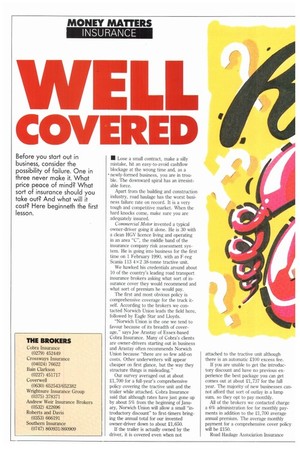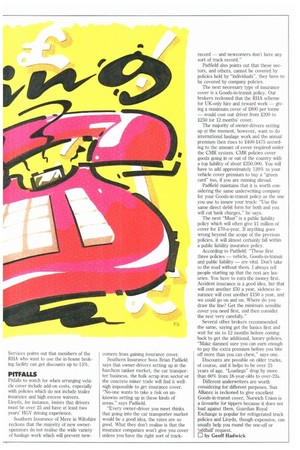coif
Page 40

Page 41

If you've noticed an error in this article please click here to report it so we can fix it.
ED
Before you start out in business, consider the possibility of failure. One in three never make it. What price peace of mind? What sort of insurance should you take out? And what will it cost? Here beginneth the first lesson.
• Lose a small contract, make a silly mistake, hit an easy-to-avoid cashflow blockage at the wrong time and, as a newly-formed business, you are in trouble. The downward spiral has an irresistable force.
Apart from the building and construction industry, road haulage has the worst business failure rate on record. It is a very tough and competitive market. When the hard knocks come, make sure you are adequately insured.
Commercial Motor invented a typical owner-driver going it alone. He is 30 with a clean HGV licence living and operating in an area "C", the middle band of the insurance company risk assessment system. He is going into business for the first time on 1 February 1990, with an F-reg Scania 113 4 x 2 38-tonne tractive unit.
We hawked his credentials around about 10 of the country's leading road transport insurance brokers asking what sort of insurance cover they would recommend and what sort of premium he would pay.
The first and most obvious policy is comprehensive coverage for the truck itself. According to the brokers we contacted Norwich Union leads the field here, followed by Eagle Star and Lloyds.
"Norwich Union is the one we tend to favour because of its breadth of coverage," says Joe Arastay of Essex-based Cobra Insurance. Many of Cobra's clients are owner-drivers starting out in business and Arastay often recommends Norwich Union because "there are so few add-on costs. Other underwriters will appear cheaper on first glance, but the way they structure things is misleading."
Our survey averaged out at about £1,700 for a full-year's comprehensive policy covering the tractive unit and the trailer while attached. Cobra Insurance said that although rates have just gone up by about 5% from the beginning of January, Norwich Union will allow a small "introductory discount" to first-timers bringing the annual total for our invented owner-driver down to about 21,650.
If the trailer is actually owned by the driver, it is covered even when not attached to the tractive unit although there is an automatic £100 excess fee.
If you are unable to get the introductory discount and have no previous experience the best package you can get comes out at about £1,737 for the full year. The majority of new businesses cannot afford that sort of outlay in a lump sum, so they opt to pay monthly.
All of the brokers we contacted charge a 6% administration fee for monthly payments in addition to the £1,700 average annual premium. The average monthly payment for a comprehensive cover policy will be £150.
Road Haulage Assbciation Insurance Services points out that members of the RHA who want to use the in-house braking facility can get discounts up to 15%.
PITFALLS
Pitfalls to watch for when arranging vehicle cover include add-on costs, especially with policies which do not include trailer insurance and high excess waivers. Lloyds, for instance, insists that drivers must be over 25 and have at least two years' HGV driving experience.
Southern Insurance of Mere in Wiltshire reckons that the majority of new owneroperators do not realise the wide variety of haulage work which will prevent new
corners from gaining insurance cover.
Southern insurance boss Brian Padfield says that owner-drivers setting up in the hazchem tanker market, the car transporter business, the bulk scrap iron sector or the concrete mixer trade will find it wellnigh impossible to get insurance cover. "No-one wants to take a risk on unknowns setting up in these kinds of areas," says Padfield.
"Every owner-driver you meet thinks that going into the car transporter market would be a good idea, the rates are so good. What they don't realise is that the insurance companies won't give you cover unless you have the right sort of track
record and newcomers don't have any sort of track record."
Padfield also points out that these sectors, and others, cannot be covered by policies held by "individuals", they have to be covered by company policies.
The next necessary type of insurance cover is a Goods-in-transit policy. Our brokers reckoned that the RHA scheme for UK-only hire and reward work — giving a maximum cover of 2800 per tonne — would cost our driver from 2200 to 2250 for 12 months' cover.
The majority of owner-drivers setting up at the moment, however, want to do international haulage work and the annual premium then rises to .2400-£475 according to the amount of cover required under the CMR system. CMR policies cover goods going in or out of the country with a top liability of about £250,000. You will have to add approximately 120% to your vehicle cover premium to buy a "green card" too, if you are running abroad.
Padfield maintains that it is worth considering the same underwriting company for your Goods-in-transit policy as the one you use to insure your truck: "Use the same direct debit form for both and you will cut bank charges," he says.
The next "Must" is a public liability policy which will often give £1 million of cover for 70-a-year. If anything goes wrong beyond the scope of the previous policies, it will almost certainly fall within a public liability insurance policy.
According to Padfield: "These first three policies — vehicle, Goods-in-transit and public liability — are vital. Don't take to the road without them. 1 always tell people starting up that the rest are luxuries. You have to earn the money first. Accident insurance is a good idea, but that will cost another £50 a year, sickness insurance will cost another £150 a year, and we could go on and on. Where do you draw the line? Get the minimum sensible cover you need first, and then consider the rest very carefully."
Several other brokers recommended the same, saying get the basics first and wait for six to 12 months before coming back to get the additional, luxury policies. "Make damned sure you can earn enough to pay the extra premium before you bite off more than you can chew," says one.
Discounts are possible on older trucks, of course, and it helps to be over 23 years of age. "Loadings" drop by more than 60% from 18-year-olds to over-23s.
Different underwriters are worth considering for different purposes. Sun Alliance is reckoned to give excellent Goods-in-transit cover, Norwich Union is a favourite for tippers because it does not load against them, Guardian Royal Exchange is popular for refrigerated truck policies and Lloyds, though expensive, can usually help you round the one-off or 'oddball' request.
El by Geoff Hadwick




































































































































